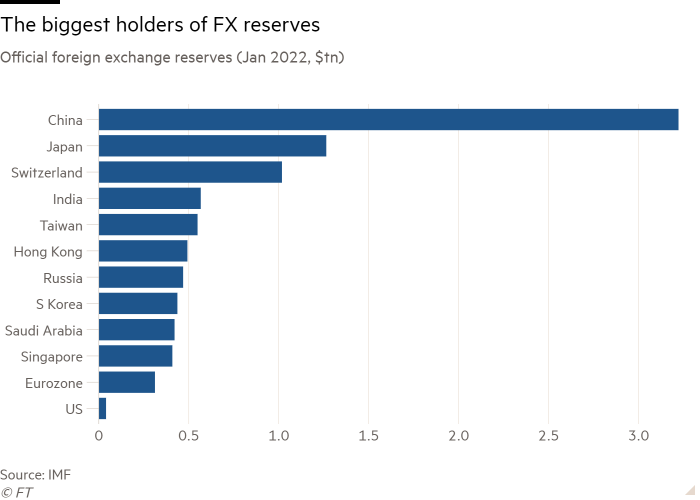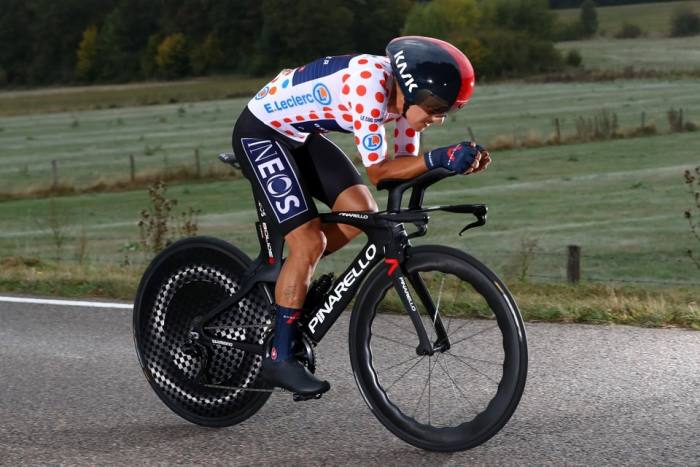[ad_1]
Good morning. This article is an on-site version of our FirstFT newsletter. Sign up to our Asia, Europe/Africa or Americas edition to get it sent straight to your inbox every weekday morning
The US has imposed its most severe level of sanctions on Sberbank, Russia’s largest financial institution, and Alfa-Bank, the country’s biggest private bank, escalating its economic response to atrocities committed by Moscow’s forces in Ukraine.
The announcement on Wednesday of “full blocking sanctions”, which prevent the lenders from transacting with any US institutions or individuals, came after top officials including President Joe Biden warned this week that they were planning to impose harsher restrictions on Russia.
“There’s nothing less happening than major war crimes,” said Biden. “Responsible nations have to come together to hold these perpetrators accountable. And together with our allies and our partners, we’re going to keep raising economic costs and ratchet up the pain for [Vladimir] Putin.”
The US also imposed sanctions on Putin’s two adult daughters; the wife and daughter of Sergei Lavrov, foreign minister; and members of Russia’s Security Council, including Dmitry Medvedev, former president, and Mikhail Mishustin, prime minister.
The latest on the war in Ukraine:
-
Sanctions: The US has charged Kremlin-connected businessman Konstantin Malofeyev with violating sanctions, the first such criminal proceedings since the start of the conflict.
-
Evacuation: Ukraine authorities have urged civilians in the Donbas region and around Kharkiv to evacuate after Russian forces stepped up their offensive in the east of the country.
-
Debt: Russia moved one step closer to a potential default on its foreign currency debt after the finance ministry said the country was forced to make payments to holders of its dollar-denominated bonds in roubles.
-
Interview: Levi Strauss does not expect to reopen in Russia this year, its chief executive said a month after the California jeans maker “temporarily” suspended its operations in the country.
-
Energy: Europe is under pressure to end its decades-long dependence on Russian oil and gas, but an analysis of the top global producers shows how difficult it would be to remove them from the energy mix.
Follow our live blog for the latest news on the conflict and our regularly updated maps tracking Russia’s invasion of Ukraine. Thanks for reading FirstFT Europe/Africa — Gary
Five more stories in the news
1. UK struggles to reclaim billions in Covid loan fraud Rishi Sunak has vowed that the government would “do everything we can to get that money back and go after those who took advantage of the pandemic”, but experts warn that the sheer scale of the fraud, which could amount to £4.9bn of the £47bn lent to companies, will make this difficult.
2. Meta targets virtual currency market with ‘Zuck Bucks’ Meta has drawn up plans to introduce virtual coins, tokens and lending services to its apps, as Facebook’s parent company pursues alternative revenue streams and features to attract and retain users despite the collapse of its previous cryptocurrency project, Diem.

3. Think-tank urges aligning UK tax rates on income sources Reforming the UK’s tax system by aligning the rates charged on different sources of income would improve “horizontal” equality and raise more revenue from wealthy individuals, according to a report by the Institute for Fiscal Studies.
4. US brings foreign banks into intelligence-sharing fold US federal agencies are sharing intelligence with foreign banks to bolster defences against potential cyber attacks in retaliation for the unprecedented economic sanctions imposed on Russia.
5. Former Credit Suisse executive probed over misconduct Brian Chin, the head of Credit Suisse’s investment bank, was allegedly under investigation for his treatment of women when he was fired for his role in the collapse of family office Archegos Capital last year.
Coronavirus digest
-
Shanghai’s lockdown “will have a global effect on almost every trade”, said Mads Ravn, global head of air freight procurement at DSV.
-
China’s Covid restrictions are exacerbating shortages of fertiliser, labour and seeds.
The day ahead
World Health Day The World Health Organization is set to publish its annual World Health Report. (WHO)
G7 foreign ministers meet Officials will continue proceedings in Brussels, where Liz Truss, UK foreign secretary, is expected to call for tougher unified action against Russia.
Economic data The European Central Bank is to release its monetary policy accounts and eurozone February retail sales data. Germany reports February industrial production figures. The UK’s Office for National Statistics unveils quarterly productivity figures. Halifax to release March house price index.
Bank of England BoE chief economist Huw Pill will deliver the opening remarks at the 8th International Conference on Sovereign Bond Markets.
What else we’re reading
The weaponisation of finance, part 2 The second of a two-part series on the new era of financial warfare examines how the sanctions freezing Russia’s foreign currency reserves have created an incentive for countries to bypass the US currency. The big question now is: Will there be a backlash against the dollar?

The Franciscan monk helping the Vatican take on — and tame — AI Engineer, teacher, ethicist and priest — Paolo Benanti is all of these things. He is also helping the Vatican to navigate the moral and ethical issues surrounding cutting-edge technologies such as bioaugmentation, neuroethics and artificial intelligence.
No-fault divorce laws: an end to the blame game? The long-awaited shake-up of divorce laws in England and Wales came into effect this week, allowing couples to part without holding one party accountable for the marriage breakdown. It could mean cheaper and easier financial settlements.
‘The forces of self-interest and technology cannot be undone’ As part of the Economists Exchange series featuring conversations between top FT commentators and leaders in the field, former World Bank economist Branko Milanovic considers Africa’s growing role in global inequality.
‘Privacy concerns should not block EU’s attempts to curb big tech power’ While there are details to come about combining security and competition in the EU’s Digital Markets Act, it is not mission impossible, writes Marietje Schaake, international policy director at Stanford University’s Cyber Policy Center.
Fitness
Boost your ride with investment-worthy cycle hacks, from 3D-printed saddles to Tour de France-tested wheelsets. Fergus Scholes rounds up the 14 best bike upgrades.

Recommended newsletters for you
Working It — Discover what’s shaking up the world of work with our latest newsletter, Working It, from work & careers editor Isabel Berwick.
Disrupted Times — Your essential FT newsletter about the changes in business and the economy between Covid and conflict. Sign up here
Thank you for reading and remember you can add FirstFT to myFT. You can also elect to receive a FirstFT push notification every morning on the app. Send your recommendations and feedback to firstft@ft.com. Sign up here
[ad_2]
Source link
